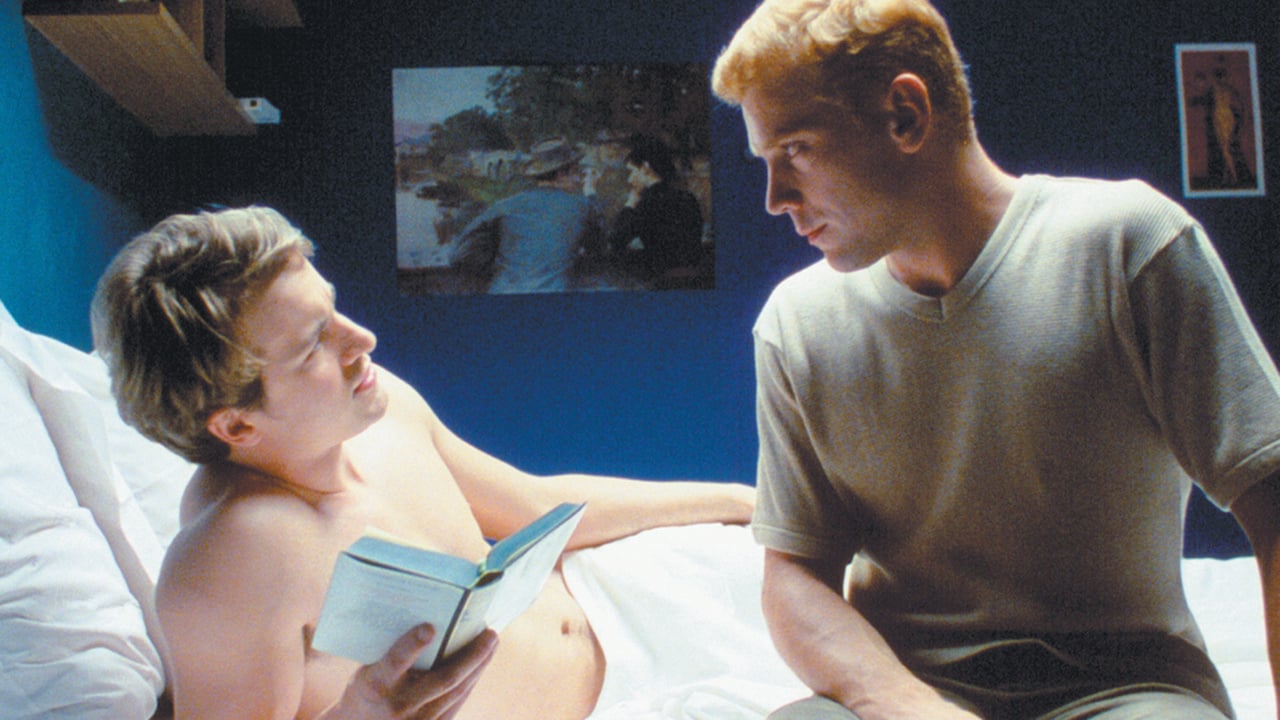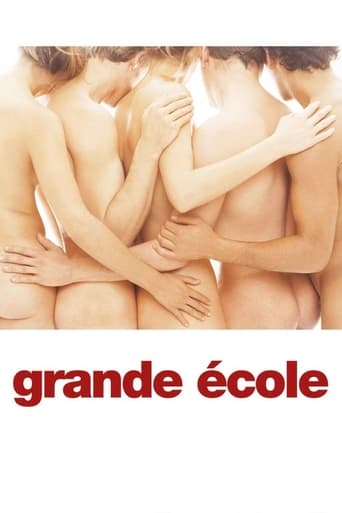

Intense, gripping, stylish and poignant
... View MoreA lot of fun.
... View MoreThe film creates a perfect balance between action and depth of basic needs, in the midst of an infertile atmosphere.
... View MoreThe plot isn't so bad, but the pace of storytelling is too slow which makes people bored. Certain moments are so obvious and unnecessary for the main plot. I would've fast-forwarded those moments if it was an online streaming. The ending looks like implying a sequel, not sure if this movie will get one
... View MoreThe movie is as stereotypical as it can be. The characters are plain and predictable. I feel as if the movie was a the-dreamers-wanna-be, given that they were trying to portray liberal characters such as Agnès and trying to be philosophical at the same time, but they did not succeed. I lost track of the movie halfway. I don't know if it was only me, but the three roommates looked very alike and I still confused them at the end of the movie. Definitely not worth my time. I gave it three stars because there were some scenes that were good: passionate and lustful. I liked, however, the way they criticized the educational system in France and the social class division, aristocracy and bourgeoisie.
... View MoreMuch as I would like to be able to endorse this earnest effort, it really is a messy hodge-podge of implausible, unconvincing plot, twisted logic, mediocre cinematography, poor editing, bad hair color and unsatisfying conclusion. The shower scenes of the swim team are enticing if you're into men's bodies (it's hard not to be, after all), but they make their point too obviously and for too long.The blond has a bad bleach job and the stock, naïve redhead has another bad dye job. The guys in bed together are so obviously not into it that it's laughable. You come away wondering if the point is one of those inscrutable, pseudo-intellectual French lessons that the world is a confusing enough place, and if you through sex into the mix it's even muddier. The flat-footed provocation of naming one of the leads "Arnault" (for the uninitiated, the richest man in France is Bernard Arnault, an unusual spelling that cannot be a coincidence) is silly, and the ending isn't mysterious, just dopey.The reference at the beginning to being from "Lot-et-Garonne" is like saying he's from Appalachia, terribly arch. The subtitles are poor, including even such mistakes as "Give us free reign /s.b. 'rein'/ and "it's" for 'its.'" This is a library item, not a keeper.PS: having viewed the "making of" and "deleted scenes" add-ins I feel more positive about the director's efforts. He at least acknowledged the miserable dye job on the redhead, and his heart is in the right place as to his motivation in making the movie.
... View MoreThere's a touch of Rohmer in "Grande Ecole". Characters, set in unglamorous, surburban spaces, are just a little too intent and penetrating to be real. Their emotions are simple, yet surprisingly delicate. They experience no jealousy or revenge, but desire, self-doubt and tenderness. Like Rohmer's, Salis' movies feel too nostalgic and sweet to be topical, and that aestheticism is put to the use of tolerance and humanism. Sex scenes for example are remarkable. Homo- and heterosexual love become comparable because Salis makes caressing and enticing the cornerstone of every sexual encounter. The movie however becomes overtly theatrical towards the end, and does not tune in with the closure that Rohmer would have gone for. Salis resolves conflicts, by now difficult to disentangle, only by confusing the viewer to a point of no return and settling for the beauty of seeing all characters reunited finally, if not in the movie, at least on the screen: him and her, and him and her, and him.
... View MoreI am one of the people that was moved by this film. It is a great film, not perfect, but nonetheless great. This is a comment for people who have seen the film, so if you haven't and plan to, don't continue ! First, I have read all the reviews here and find many have some pretty off observations about the movie. The film plays like a theater piece because it is adapted from a play written in the early 90s. Salis, too, comments that he wanted to keep the theatrical feeling in most of the film. Thus, the movie can be very wordy at points, but the words are generally well chosen. Someone here said that all the men are uncircumcised because they are French. Well, the second male lead, Salim Kechiouche, is an Arab Muslim and he is circumcised. Also, another said that Kechiouche's character, Mecir, is obviously a practicing Muslim. Considering that he is drinking wine on his first date with Paul, it is obvious he is not a practicing Muslim. And then someone said that Paul and Agnes go to schools that are side by side. Well, in fact, Paul is attending a grande ecole quite a distance out of Paris, while Agnes is attending a school in Paris itself. That is one of the reasons given at the very start of the movie for why Paul and Agnes will not live together. OK, I am just being picky, but thought these misobservations should be cleared up. Now, for the film itself. First, the only truly big quibble I have with it is the male on male erotic scenes. The problem here is that neither Baquet or Kechiouche are gay or bisexual. Thus, they don't kiss each other very convincingly. Their erotic scenes are meant to be highly stylized, but with the tentative kissing, the scenes don't work as well as they could have. If I were Salis, I would have asked the two to rehearse kissing until they could do so with passion and tenderness. However, the affectionate scenes with the two, such as the two scenes in Mecir's car, are very sweet and touching. Overall I thought the acting was very good. Baquet and Kechiouche are esp affecting. The final scene of the two together at the Bibliotheque Nationale is esp memorable. Paul's sudden realization that Louis-Arnaut has known for a long time that Paul loves him, but instead of saying something to Paul, Louis-Arnaut only plays with his mind. Then Mecir's trying to console Paul, only to be rebuffed, which leads Mecir to utter words he probably couldn't have before, that he loved Paul. Remember in the car, Mecir refused to be called homosexual. I feel that is because in his Arab culture, it may be OK to have sex with a man, but not to be called a fag or homo. The next scene seems to bother people the most, the final confrontation of Paul and Louis-Arnaut. I liked the scene, and it fits given that both Paul and Agnes are considered lit people, that is wordy dissectors of life, something neither Louis-Arnaut nor Emeline, his girlfriend, likes. However, it is the ensuing scene between Paul and Agnes that is fundamental for clarifying the rather open ended finale. Paul tells Agnes that he slept with Louis-Arnaut. If I am not mistaken, it is a lie. But the wager Agnes proposed to Paul is that if she can sleep with Louis-Arnaut before Paul can, Paul must give up his fantasies of him and move in with her. However, if Paul can sleep with him first, she said she would leave Paul. He lies and says he did sleep with him. And it seems right that he does lie. Both Agnes and Louis-Arnaut had been manipulating him, albeit, Agnes does so openly.(Interestingly, Agnes then puts Mecir's love gift to Paul around his neck, not knowing what she is doing because Paul told her that he bought the gold chain for himself.) Thus, when he boards the train at the end, I feel he has left the school and Agnes. It is not clear that he going to Mecir, but Mecir is the only other character in the final scene and Paul, smiling broadly, is toying with Mecir's chain. I have watched the film a couple of times now and it has lingered in my mind for quite awhile. It is one of those films that, for me, seems alive, the characters exist and I care about them. Salis has said it is a film about choice whereas some here say it is truly just a gay film. To me it is both. Paul has to choose not only between men and women, between respectable conformity and self fulfillment, but also between Louis-Arnault and Mecir. He has made the wrong choice with Louis-Arnaut, but the ending allows one to hope he has his eyes open now.
... View More